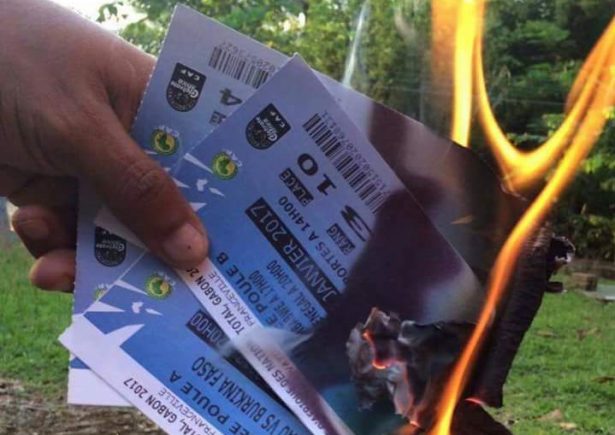Activists in the former French colony Gabon have launched a boycott of the 31st Africa Cup of Nations. At a press conference last week in Libreville, the capital of Gabon, they said they didn’t want the Pan-African soccer competition — which began on Jan. 14 and will run through Feb. 5 — to take place in Gabon “as long as the truth of the ballot boxes is not restored.” The activists, who are members of Tournons La Page, or Turn The Page, a collective that fights for democracy in Africa, exhorted people to stay home and not to attend the games.
While the campaign has not convinced all soccer lovers, its impact is clear. The French newspaper Le Parisien reports that the stadium was half-empty at the opening ceremony. On Monday, the match between Cote-d’Ivoire and Togo took place in an almost empty stadium.
French rapper Booba and American-born Senegalese singer Akon, who attended the opening ceremony on Saturday, were strongly criticized for supporting an event organized by a “dictator.”
During an anti-cup demonstration in the neighborhood of Malekou in Libreville on Jan. 18, a well-known activist Marceau Malekou was arrested with three others. The campaign is also taking place on social media, where people are sharing pictures of themselves burning their tickets.

The Africa Cup of Nations is the most popular soccer event in Africa, which takes place in an African country every two years. In ordinary times, all Gabonese would be proud to see their country host it. But Gabon, is in the midst of a political crisis.
The country has been ruled by the Bongo family since 1967, when the late Omar Bongo Ondimba took power. After his death in 2009, he was replaced by his son, the current president Ali Bongo Ondimba, who “won” his first seven-year term in a controversial election. The current turmoil started with the presidential election that was held in August 2016, when the incumbent was declared the winner with 49.8 percent of the vote, while the opposition candidate Jean Ping garnered 48.2 percent.
But Ping and his supporters believe the opposition candidate won the election by a large margin. They accused Bongo of falsifying the election results in the region of Haut-Ogooué, where, according to official results, he received 95.46 percent of the vote with an unbelievable 99.83 percent of the population participating. Nationally, the participation rate was 59.5 percent. For the opposition and many civil society organizations, Bongo has simply stolen power.
After the declaration of the results on August 31, the opposition called for mass protests which escalated into violent confrontation with security forces, according to the European Union observation mission. The residence of the opposition leader Jean Ping was attacked by security forces and many opposition leaders were arrested. At least 27 people were killed during the protests, and more than 800 people in Libreville and 300 in other areas were arrested. Many news sites have been the subject of cyber attacks and the private TV channels RTN and TV+ were ransacked and partially destroyed.
In the week following the announcement of the results, three important people resigned from Bongo’s party: the second deputy prime minister and their representatives in France and the United States. The first two have publicly invited their candidate to acknowledge his defeat.
Six months after the post-electoral violence, the Gabonese government wants the Africa Cup of Nations to succeed and to serve as testimony that the crisis is over and that the situation in the country has normalized. But the activists see it as an opportunity to show the world that the political situation is not normal at all.
“In a normal democracy, boycotting the Africa Cup of Nations for political purposes would not be appropriate” wrote Be Mba Max, one of the activists. “But, in Gabon, we are reduced to that — it is the only option we have left to express a political opinion without taking the risk of being hunted, terrorized, beaten or killed.”

The opposition never called for a “mass protest” as you’re stating. The protest was spontaneous from a population frustrated by 50 years of the same family at the head of their country and moreover because their votes never counted since the so-called instauration democracy in 1990. In this election, the fraud this regime used to reverse the results in its favor was as obvious as a nose in the middle of the face. The EU report shows without any single doubt what everyone knows that Mr. Jean Ping won the elections. The boycott also found is foundation on the fact that dozens of people were killed and their bodies immediately were taken away. Hundreds of Gabonese family are still looking for their loved ones who where kidnapped in Jean Ping’s HQ and also in the streets. Many militants of the opposition are still detained in the central prison of Libreville. This cup is used by this regime to seek an international recognition as Gabon is facing a severe financial crise due to all the misappropriation of public funds, and therefore didn’t need within 4 years a second organization of a African Cup of Nations which costs to the taxpayers 500 billions xaf time 2, money that could have served in building schools, hospital and pull the population out of excessive poverty. Mr. Jean Ping didn’t auto proclaim himself President, but he is the President-Elect of Gabon.
I couldn’t agree more brother Obiang